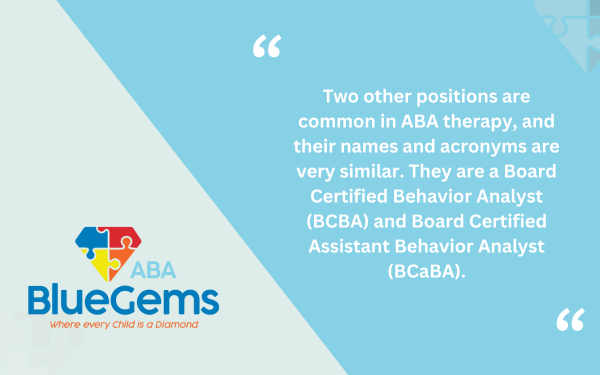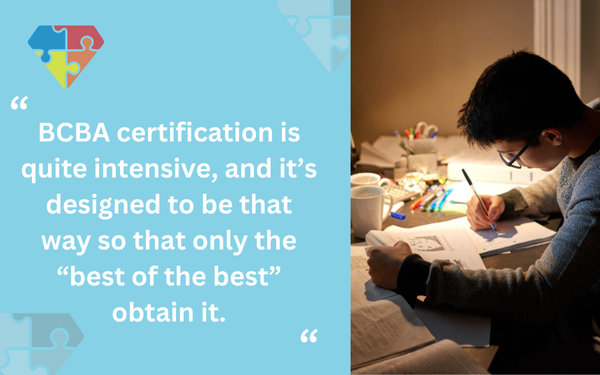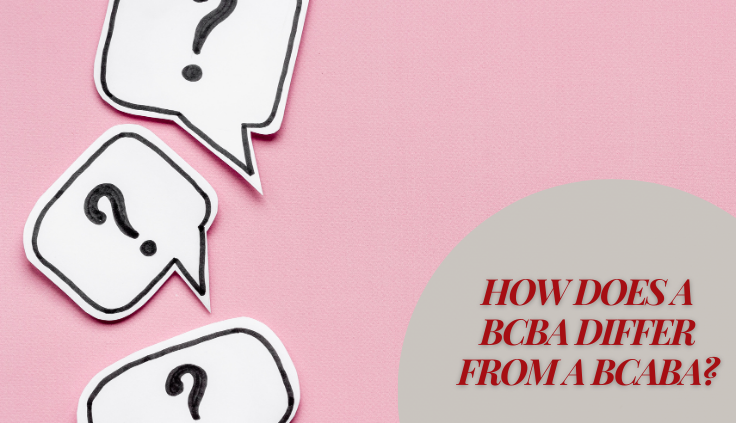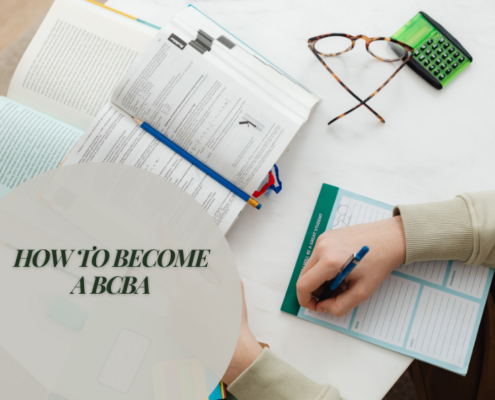How Does a BCBA Differ from a BCaBA?
With so many different acronyms in healthcare, it can be difficult sometimes for people outside the field to understand the differences between them. This is the case with applied behavior analysis (ABA therapy), which is the leading treatment program for children with autism spectrum disorder (ASD).
In ABA therapy, there are many different certifications that people need to obtain to hold certain positions in the field. For example, Registered Behavior Technicians (RBTs) interact directly with patients often, administering personalized treatment plans to children based upon their unique strengths and challenges.
Two other positions are common in ABA therapy, and their names and acronyms are very similar. They are a Board Certified Behavior Analyst (BCBA) and Board Certified Assistant Behavior Analyst (BCaBA).

So, what is the difference between a BCBA and a BCaBA? We’ll break it all down for you below.
Table Of Contents
What Can a BCaBA Do?
BCaBAs can play a big role in ABA therapy. They are authorized to work in crafting intervention plans, analyze data, and conduct evaluations and assessments.
People who hold the BCaBA certification can also serve in a supervisory role, with RBTs reporting directly to them.
What Does BCaBA Certification Entail?
A lot of times, workers will first obtain BCaBA certification before they proceed one step further, which is BCBA certification.
To become a BCaBA, you must earn at least your bachelor’s degree at a program that the Association for Behavior Analysis International (ABAI) accredits. After schooling, you have to complete 1,300 hours of supervised fieldwork, or you can complete 1,000 hours of supervised fieldwork if it’s concentrated.
In addition to these hours, you have to pass a certification exam that’s administered by the ABAI.
What Can a BCBA Do?
BCBAs are basically the next step up from being a BCaBA. This higher-level certification allows you to provide services to patients independently as a practitioner on your own.
This means you will have more options for where you would like to work, or even if you want to start your own practice at some point in your career. BCBAs can be the supervisors of both RBTs and BcABAs, and they can be directors of entire ABA therapy clinics.
Some of the services that they can provide include helping patients improve their social and communication skills, daily living skills and behavioral regulation, among other things.
| BCaBA | BCBA | |
|---|---|---|
| Degree Requirement | Bachelor’s Degree (ABAI-accredited) | Master’s Degree (ABAI-accredited) |
| Supervised Fieldwork | 1,300 hours (or 1,000 concentrated) | 2,000 hours (or 1,500 concentrated) |
| Supervisory Roles | Can supervise RBTs | Can supervise RBTs and BCaBAs |
| Independent Practice | Not authorized | Fully authorized |
| Common Career Path | Step toward BCBA | Leadership and independent roles |
What Does BCBA Certification Entail?
BCBA certification is quite intensive, and it’s designed to be that way so that only the “best of the best” obtain it.

In addition to earning a bachelor’s degree from an accredited program in a certain area of study, you must also obtain your master’s degree. This is a much more significant investment of time, effort and money for your education.
There is also a requirement for supervised fieldwork, but that increases to 2,000 regular hours or 1,500 concentrated hours for BCBAs. In addition, a certain percentage of your supervised hours must happen during set “supervisory periods.”
At the end of this supervised fieldwork, you must also pass a certification exam to become a BCBA.
Which Certification is Right for You?
Choosing between becoming a BCaBA or a BCBA is a very personal decision. Some of the major factors you should consider include …
- Education commitment (bachelor’s vs. master’s degree)
- Time commitment (an extra 500 supervised fieldwork hours)
- Examination difficulty (harder to pass the BCBA exam)
- Financial commitment (extra investment associated with master’s degree and exam)
- Your desired position (whether you want to practice independently or not)
These are just a few of the things you should consider if you’re deciding whether to become a BCaBA or a BCBA. As mentioned before, many people start by earning BCaBA certification and then decide whether they want to pursue the higher level of certification.
Blue Gems ABA Has an Experience Team Supporting Children with Autism
While there are many similarities between a BCaBA and BCBA, there are some stark differences as well, including what’s required to earn certification and what roles and responsibilities you can have.
No matter what certification you decide to pursue, you can make a tremendous difference in the lives of children with ASD and other conditions.
At Blue Gems ABA, we have a large experienced team of RBTs, BCaBAs and BCBAs who are all dedicated to supporting children on the autism spectrum by administering ABA therapy. In doing so, we help children with autism build the social, communication and daily life skills with which they typically struggle.
To learn more, please contact us today.










